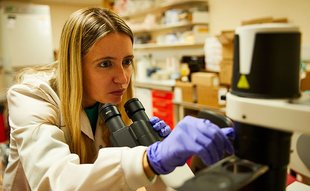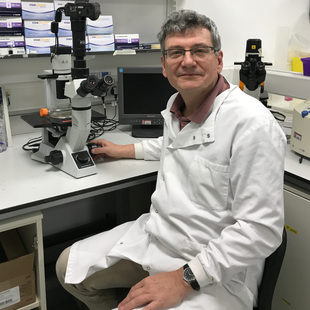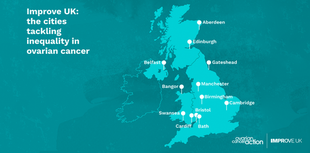What has happened with our research this year?

Scientific and clinical research at Ovarian Cancer Action
2022 was a big year for scientific and clinical research at Ovarian Cancer Action, from progress across our landmark IMPROVE UK programme to advances in developing new treatments. Here are a few highlights:
A nationwide trial uniting UK researchers
BriTROC-2 is an ambitious trial that involves collecting samples from across the country and brings researchers together to study how the DNA in different high-grade serous ovarian cancers changes over time. We want to understand why some high-grade serous cancers come back after surgery and chemotherapy.
In the sample collection phase, 7 of the 10 sites taking part in recruiting patients and collecting samples have opened with the number of patient samples collected on target. Work to prepare for analysis will begin in the next year.
On the way to early diagnosis
95% of women will survive their cancer for five years or more if they are diagnosed at stage 1. Yet, the majority are diagnosed at stages 3c and 4. Professor Ahmed is making strides to learn about how ovarian cancer originates. By learning more about this complex molecular landscape, they hope to find biomarkers that could be used for early detection.
This year they characterised the mutations found in normal Fallopian tubes (the origin of ovarian cancer) and the characteristics of stem cells found there. They have also validated the Oxford Classic, a method for classifying ovarian cancer, which could one day could be used to work out a patient’s prognosis.
Making armies out of people’s immune cells
Professor Ahmed at Oxford University is studying T-cells to develop a type of treatment called immunotherapy. T-cells play an important part in fighting infection and diseases, including cancer. In the type of immunotherapy Ahmed is developing, the T-cells are taken from the patient and revitalised in the lab to give back to the patient.
In the first year of the project, Ahmed and his team developed crucial methods for expanding patients’ T-cells in the lab and methods for checking if T-cells are killing cancer cells or not. They have also developed mini versions of normal Fallopian tubes (the organ where ovarian cancer originates) and tumours to test their methods. Finally, they have also discovered a unique population of T-cells that have features that might make them optimal for fighting ovarian cancer.

Professor of Molecular and Cellular Immunology, Professor Graham Cook
Using viruses that target cancer cells as a novel treatment
Ovarian cancer can grow more quickly by suppressing the immune system. To tackle this Professor Cook and his team are studying viruses that target and kill cancer cells while also delivering molecules to restore the immune system.
Such viruses don’t affect human cells and have proven to be safe in clinical trials with one already being approved for the treatment of another type of cancer. The team has already shown that viruses expressing a certain molecule extend the life of mice with ovarian cancer and they want to see if the approach works in humans. If this works, they can then develop the therapy for a clinical trial.
IMPROVE UK
This year, seven ground-breaking projects across all four nations started to tackle health inequalities for women with ovarian cancer. Read more about their progress

Improve UK: the cities tackling inequality in ovarian cancer
Thank you
From everyone at Ovarian Cancer Action, we want to thank you for your support. You make it possible to fund this research. We also thank our Research Network which ensures the research we fund has the patients at the heart of it. Finally, a thank you to the experts in the field who review our research funding to ensure we can select and fund the most impactful research to make a difference in women’s lives.
To help us continue to fund more groundbreaking research, please consider making a donation.